What is Sleep Apnoea?
Sleep Apnoea is a sleep disorder in which breathing is briefly and repeatedly interrupted during sleep. The “apnoea” in sleep apnoea refers to a breathing pause that lasts at least ten seconds. Obstructive sleep apnoea occurs when the muscles in the back of the throat fail to keep the airway open, despite efforts to breathe.
Obstructive sleep apnoea (OSA), or simply sleep apnoea, can cause fragmented sleep and low blood oxygen levels. For people with sleep apnoea, the combination of disturbed sleep and oxygen deprivation may lead to hypertension, heart disease and mood and memory problems. Sleep apnoea also increases the risk of drowsy driving.
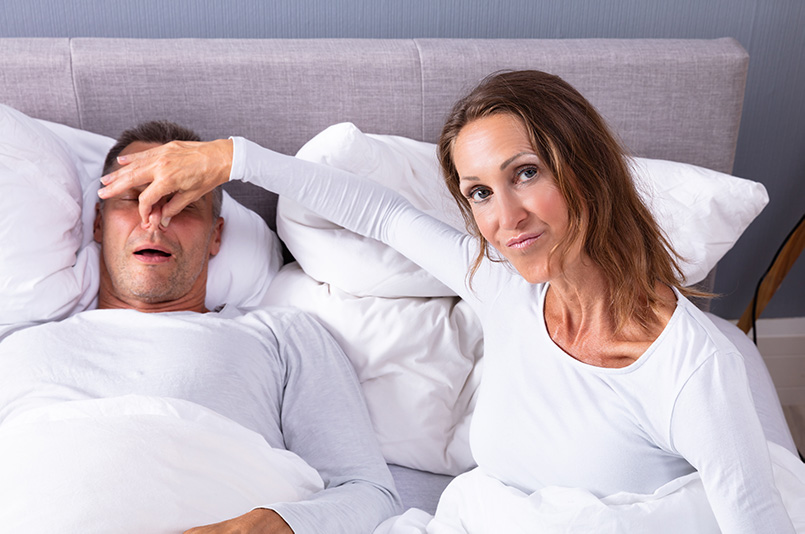
Snoring
When Snoring Becomes Sleep Apnoea?
It starts when the breathing becomes very shallow due to these obstructions in the airway. The sleeper is not able to breathe deeply and take in enough oxygen. “Sometimes the airway completely blocks, causing the person to make a choking or snorting sound and often waking them up in an attempt to breathe,” says Dr Bond. “This condition is known as obstructive sleep apnea.”
Patients with obstructive sleep apnoea experience a pattern of similar events that repeat throughout the night, sometimes hundreds of times. The number of breathing pauses per night, the duration of each pause and the lack of oxygen, in part, determine the severity of obstructive sleep apnea.
Not all patients who snore have sleep apnoea, and not all patients who have sleep apnoea snore. However, because snoring could be a precursor to sleep apnoea and is often a symptom of sleep apnoea, it should not be ignored.
Do Dental Appliances work for Snoring?
Worn only during sleep, an oral appliance fits like a sports mouth guard or an orthodontic retainer. It supports the jaw in a forward position to help maintain an open upper airway. Research shows that oral appliance therapy is an effective treatment option for snoring and obstructive sleep apnoea.
Sleeping with a Snorer
Studies show that the person with sleep apnoea isn’t the only one waking up or suffering from sleep deprivation. When the apnoea is followed by loud snorts and snoring, the bed partner may wake up as often during the night as the person with the actual sleep disorder. This can then have an adverse effect on their health and wellbeing.
Treatment for Snoring & Sleep Apnoea
Treatment options for snoring and/or sleep apnoea may include lifestyles changes, surgery, Continuous Positive Airway Pressure (CPAP) and oral appliance therapy.
Oral Appliance Therapy has proven to be a very viable and scientifically based treatment option for Snoring and/or Obstructive Sleep Apnoea.
A custom fitted dental device can in many cases be the first line of treatment for those suffering from mild to moderate Obstructive Sleep Apnoea and in many cases proving to be effective, in many cases, for severe sleep apnoea as well.
“The purpose of the oral appliance is to hold the jaw in a position that allows the airway to remain as open and firm as possible during sleep,” says Dr Bond. “Oral appliances are similar to athletic mouth guards, but less bulky and completely non-invasive,” she continues.
Do I Have Sleep Apnoea?
People with obstructive sleep apnoea almost always snore loudly.
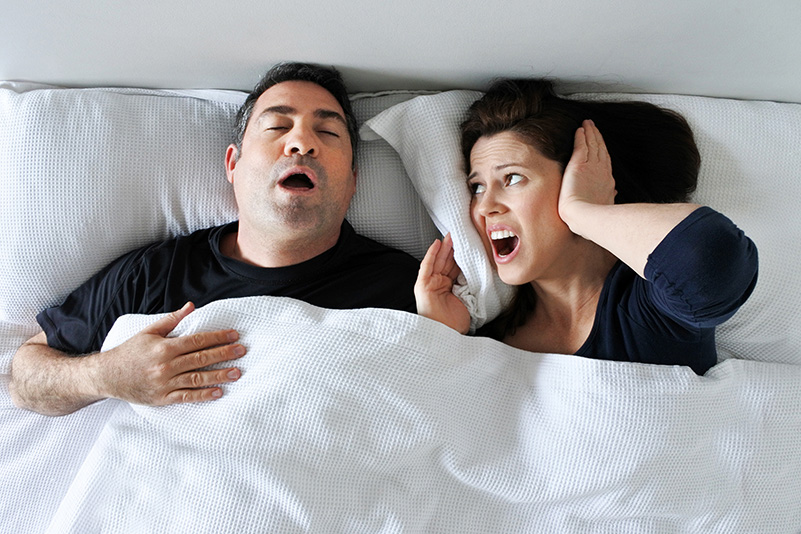
The most common signs and symptoms of obstructive sleep apnoea can include:
- Snoring – Ranging from quiet to loud.
- Episodes in which you stop breathing during sleep — which would be reported by another person
- Gasping for air /choking during sleep
- Awakening with a sore, dry throat
- Morning headache
- Difficulty staying asleep (insomnia)
- Excessive daytime sleepiness (hypersomnia)
- Difficulty paying attention while awake
- Memory deterioration
- Decreased sex drive or impotence
- Decrease in Job performance
- Personality changes that may include irritability
- Anxiety or depression
What Causes Sleep Apnoea?
During normal breathing, air is drawn through the nose and past soft tissues at the back of the throat.
During waking hours, airways are held open by the tone of the muscles around them. During sleep, these muscles relax. In some people, the soft tissues relax too much (or ‘collapse’), leading to obstruction of the airways.
The obstruction to airflow may be partial or complete. If airflow is disrupted by at least 50% for more than 10 seconds, the condition is known as apnoea.
There are a number of factors that increase risk, including having a small upper airway (or large tongue, tonsils or uvula), being overweight, having a recessed chin, small jaw or a large overbite, a large neck size (17 inches or greater in a man, or 16 inches or greater in a woman), smoking and alcohol use, being age 40 or older. Also, OSA seems to run in some families, suggesting a possible genetic basis.
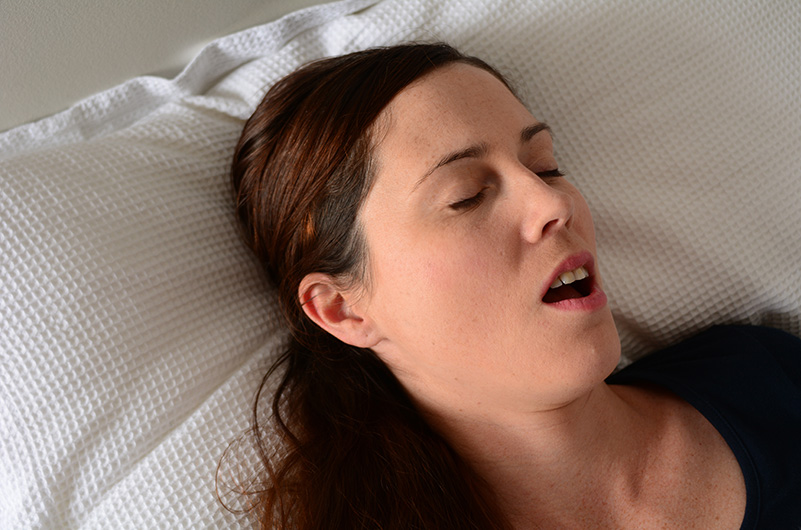
Diagnosis and Assessment of Sleep Apnoea Symptoms
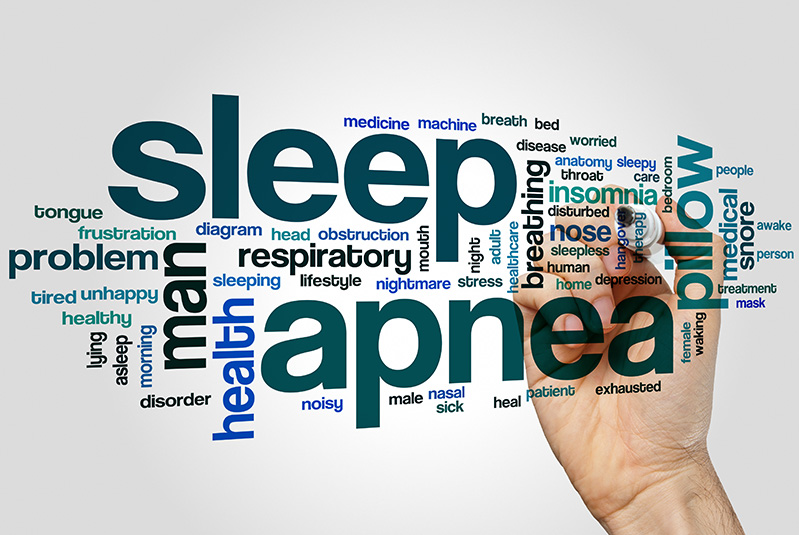
Diagnosis of the cause of sleep apnoea is crucial so that the most effective treatment can be offered. Chronic snoring is a strong indicator of sleep apnea and should be evaluated by a health professional in a sleep disorder clinic before any treatment starts.
Since people with sleep apnoea tend to be sleep deprived, they may suffer from sleeplessness and a wide range of other symptoms such as difficulty concentrating, depression, irritability, sexual dysfunction, learning and memory difficulties, and falling asleep while at work, on the phone, or driving. Left untreated, symptoms of sleep apnoea can include disturbed sleep, excessive sleepiness during the day, high blood pressure, heart attack, congestive heart failure, cardiac arrhythmia, stroke or depression.
What should you do first?
Your first step in determining if a dental appliance is a good fit for you is to have a sleep specialist determine whether you snore, or you have sleep Apnoea, and at what level. For this step you will need a referral from your GP.
Your next step is to bring your sleep study to an appointment with Dr Bond to fit you with an oral device. Alternatively, you can email Dr Bond a copy first so she can make an assessment based on the study provided and then we can call you to make an appointment. You can email the Centre at info@dentalsleepapnoeacentre.com.au
If you don’t have a sleep study but believe you are having issues with sleep Apnoea, Dr Bond can pre-assess you to determine if a sleep study may be required in your individual case, referring you to a sleep specialist if necessary to begin the progression towards alleviating your sleep issues.
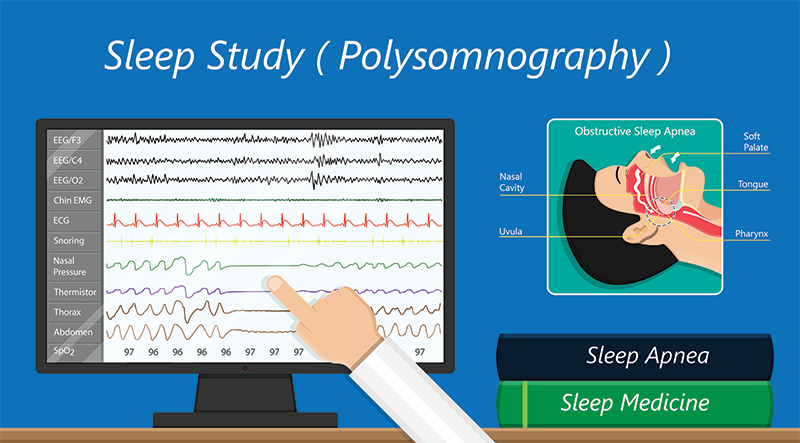
Self Assessment test for sleep apnoea
Is it possible that you have obstructive sleep apnoea (OSA)?
Work out your Sleep Apnoea risk with STOP BANG or EPWORTH SLEEPINESS SCALE (ESS)
By downloading and completing the Stop Bang Questionnaire, or the Epworth Sleepiness Scale you can, in a few minutes, help determine if you may be suffering from sleep apnoea.
Please click on the links provided to access the questionnaires.
Interpretation of results
The following shows how your score is interpreted.
Epworth Sleepiness Scale (ESS)
|
0 to 10 = normal range of sleepiness in healthy adults |
||
|
11 to 14 = mild sleepiness |
|
|
|
15 to 17 = moderate sleepiness |
|
|
|
18 to 24 = severe sleepiness |
|
|
Stop Bang Questionnaire
|
Low risk of OSA |
YES |
0-2 |
|
Intermediate risk of OSA |
YES |
3-4 |
|
High risk of OSA |
YES |
5-8 |
A score of 11 or higher represents excessive daytime sleepiness which could be a sign of a sleep disorder or medical condition. If you score 11 or higher, your doctor may recommend you see a sleep specialist.
The ESS is not a diagnostic tool and can’t diagnose a sleep disorder. The questionnaire is meant to be used as a screening tool to help your doctor determine whether you need further testing, such as a referral for a sleep study.
What is the next step?
There are other factors that can influence your results and cause your score to be higher, such as occasional insomnia.
If you’re worried about the quality of your sleep or concerned that you may have a sleep disorder, see your doctor regardless of what your self-assessment reveals. You can also email Dr Bond your results at info@dentalsleepapnoeacentre.com.au
Dr Bond can do a pre-assessment and we can make an appointment if necessary to further investigate.
